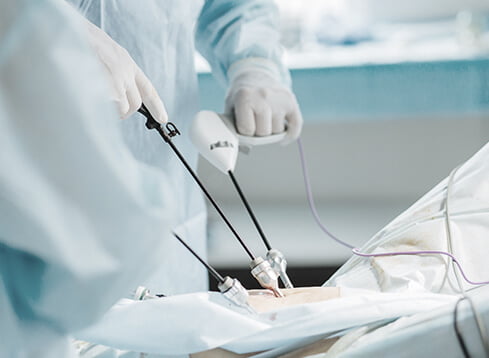— Matrika Heritage Hospital
Laparoscopic Procedures
What is Laparoscopy?
Laparoscopy is a way of doing surgery using small incisions (0.3 – 1.2 cm). It is different from open surgery where the incision on skin can be several inches long. It is also called as minimal invasive surgery (MIS).

What Gynaecological problems can be diagnosed or/and treated by gynae laparoscopic surgeon?
- Endometriosis
- Ovarian cyst
- Infertility
- Tubo ovarian masses
- Fibroid
- Chronic pelvic pain
- PCOS
- Abnormal bleeding patterns
- Tuberculosis
- Tubal Blockage
- Ectopic pregnancy
- Abnormal pelvic and uterine anomalies
What surgeries can be done with gynae laparoscopic surgeon?
- Hysterectomy where uterus along with cervix is removed from the body. Myomectomy in which fibroids are removed from the uterus. Ovarian cystectomy where ovarian cyst is removed. Infertility related surgeries and endometrosis, PCOS, ectopic pregnancy surgeries to treat endometriosis, chronic pelvic pain, pelvic inflammatory diseases and urinary incontinence are done laparoscopically.
- Diagnostic laparoscopy has taken centre stage in many countries due to its feasibility, with almost no mortalities with decreased incidence of complications
How is laparoscopic surgery done?
Laparoscopic surgery is done under general anaesthesia and it uses a special fibre optic instrument called laparoscopy, that is inserted into the abdomen through small incision, attached to a camera. This allows the surgeon to look inside your abdominal and pelvic cavity which is visualised on a video screen, without disturbing the normal anatomical relations inside the body.
Diseases can also be corrected in the same sitting by inserting additional surgical instruments through other tiny incisions. You can have 3-4 tiny incisions while undergoing laparoscopy. Once the procedure is completed, all instruments are removed, incisions are closed and area is covered with small bandages.
It is possible to record the whole surgery for future references.

What are the benefits of laparoscopy
- Smaller incision and almost invisible scars
- You will get out of the hospital quicker
- You will feel less pain as tiny scars heal quicker
- You will get back to your routine normal activities sooner
- Risk of infection is lower
- Less internal scarring
Immediate post-operative period after laparoscopy
- Immediately after the laparoscopic procedure, you may feel tired or nauseous as a result of general anaesthesia.
- You may be discharged from hospital on the day of surgery in case of diagnostic procedure, after you are able to stand and empty your bladder and can tolerate liquid or soft diet. Although overnight stay in hospital might be required in some cases to enable full recovery. If you have undergone operative procedure such as hysterectomy or myomectomy, you may be discharged after 48 hours. We are a team of best gynae laparoscopic surgeons in Darbhanga.
Recovery after laparoscopy Surgery
- You can resume normal routine activities with 2-3 days in minor procedures, however it may take little longer in major procedures. You should avoid strenuous work, heavy weights and exercise for few days after the procedure and consult your gynae laparoscopic surgeon regarding the same.
- You may be discharged from hospital on the day of surgery in case of diagnostic procedure, after you are able to stand and empty your bladder and can tolerate liquid or soft diet. Although overnight stay in hospital might be required in some cases to enable full recovery. If you have undergone operative procedure such as hysterectomy or myomectomy, you may be discharged after 48 hours. We are a team of best gynae laparoscopic surgeons in Darbhanga.
What is the risk associated with laparoscopy
Minor Complications which occur in 1 or 2 out of 100 surgeries and include:
- Infection
- Minor bleeding
- Bruising around incision
- Weight gain due to PCOS (obesity)
- Urinary retention
Laparoscopic Surgery Complications
Laparoscopy is a safe surgical procedure and hence serious complications are rare. Some rare Laparoscopy complications include-
- Damage to organs such as bowel, bladder.
- Damage to blood vessels
- Complications due to general anaesthesia and pneumoperitoneum
What is safety of laparoscopic surgery ?
- The laparoscopic surgery is a commonly performed and safe procedure if performed by a skilled and experienced surgeon; however, the risk of any operation is determined by the nature of the specific operation. An individual’s general health and other medical conditions also affect the risk of any operation. You should discuss with your gynaecologist about individual risk if any involved in your treatment.